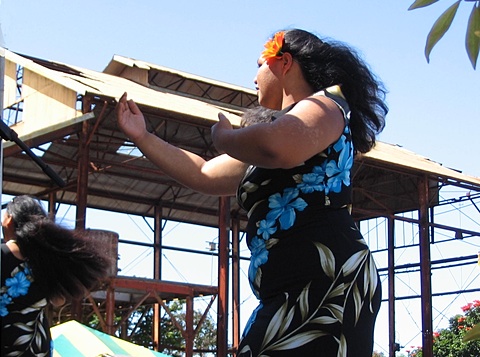by Katy Rose on 5 July 2008 in http://towardfreedom.blogspot.com
An article in today's Garden Island News offers a report on the nostalgic nature of Kekaha's Fourth of July celebration. Old photographs and mementos were collected to bring back memories of "plantation days."
Sometimes I hear from progressive white people here - malihini like myself, mostly - a kind of arrogant dismissal of what they see as naive nostalgia for an exploitative social system. This has bothered me for a while now, because I think it ignores an opportunity to understand and connect with the legitimate yearnings of local working class people.
This quote, from an event organizer, touches on the substance of that yearning: “It’s been a long time since we had a Fourth of July celebration,” said Mary Jane Buza, one of the steering committee members for the Kekaha celebration.
“We are trying to bring back that feeling when we used to get together as a community on days like this.”
It seems to me that those of us who arrive in Hawai'i with our heads full of terrific ideas should consider the values that existed during 'plantation days' and honor the yearning people express for a time when communities felt cohesive and supportive, when a lack of material wealth was compensated by a sense of security provided by deep social connection, when food gathered from the earth was shared freely between
families and friends, when going to work didn't entail a gas-guzzling commute. These all sound like sound and wonderful things to yearn for, and, in fact, to work to regain.
They echo the visions of "smart planning" , environmental and sustainability advocates, yet there is often a gulf or distrust between local working-class people and such activists.
Naturally, it makes sense to be critical of the patronizing and exploitative plantation system itself, where the rights of workers to adequate wages, benefits and safe working conditions were only won through intense labor struggles, and where respect for the health of the land was an afterthought. The new "plantations" - run by GMO corporations Syngenta and Monsanto and the military's PMRF- are imposing an exploitative and ecologically murderous logic on
the community and must be challenged.
Yet, as the article states, Syngenta and Monsanto both donated fat sums to make yesterday's celebration successful. As much as this may trouble us progressives and radicals, I think we need to understand the complexity of the corporate/citizen relationship in working-class communities like Kekaha.
I believe "another world is possible," where communities can feel secure and prosperous without depending on exploitative and ecologically devastating labor arrangements, and where nobody has to choose between putting food on the table and the safety of their children. I believe that people can live in peace without armed coercion. I believe that neighborhoods can, and regularly do, find community-based solutions to their own problems. I believe it is possible
to bring back the "good stuff" from the old days, leaving the "bad" social arrangements behind.
But this depends on people being able to work together toward common goals, and nothing shuts down camaraderie faster than arrogance and disrespect.
So, while I can almost anticipate a flurry of outrage from my progressive brethren that the community of Kekaha would accept blood money from the seed companies,
I hope that we can re asses our approach to working for that "other world," to ensure that our work is based in a commitment to mutual
understanding, trust, respect, sharing, and community-led efforts. Let's remember that those who have been here for a long time, whose families have labored in the fields and the mills, have a vision of community we can learn from.
Let's remember, as we struggle to define what "sustainability" would look like on Kaua'i, that there are many people here already who recall a "sustainable" past, and who employ sustainable practices right now. Let's leave all our arrogance behind and "meet people where they're at," without judgement and conflict...we'll save that for Syngenta, Monsanto and PMRF!
|
